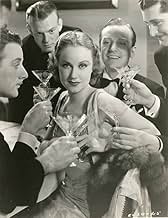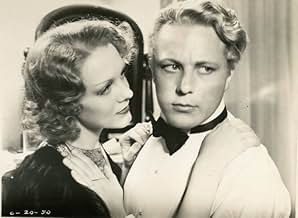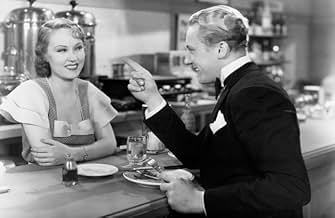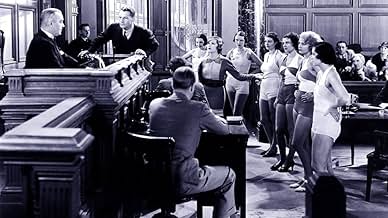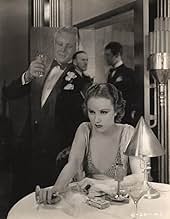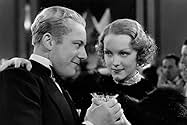अपनी भाषा में प्लॉट जोड़ेंAfter graduation from Hampden University, Bill "Lightning" Graham, a football star, and Ann Carver, who just passed her bar exam, marry. Instead of pursuing a career in law, Ann takes on the... सभी पढ़ेंAfter graduation from Hampden University, Bill "Lightning" Graham, a football star, and Ann Carver, who just passed her bar exam, marry. Instead of pursuing a career in law, Ann takes on the role of housewife, while Bill is employed as a draftsman. When Ann is asked to take on a ... सभी पढ़ेंAfter graduation from Hampden University, Bill "Lightning" Graham, a football star, and Ann Carver, who just passed her bar exam, marry. Instead of pursuing a career in law, Ann takes on the role of housewife, while Bill is employed as a draftsman. When Ann is asked to take on a high-profile legal case, she accepts and wins. She becomes an overnight success and a medi... सभी पढ़ें
- Andrew Simmons - Attorney
- (बिना क्रेडिट के)
- Irma Chappelle
- (बिना क्रेडिट के)
- Melville - Butler
- (बिना क्रेडिट के)
- Baker
- (बिना क्रेडिट के)
- Dinner Party Guest
- (बिना क्रेडिट के)
- Dinner Party Guest
- (बिना क्रेडिट के)
- Coroner
- (बिना क्रेडिट के)
- Harrison
- (बिना क्रेडिट के)
- Bill's Architect Co-Worker
- (बिना क्रेडिट के)
- Bill's Lawyer
- (बिना क्रेडिट के)
- Trial Witness
- (बिना क्रेडिट के)
फ़ीचर्ड समीक्षाएं
Although we know attitudes were very different in the 30s, it's still astonishing and thoroughly shocking to see this in the flesh. If you watch a lot of 1930s pictures you start to think that these people are just like you and that times weren't so different. You've grown to regard these little black + white celluloid people as your friends and you feel really let down by them. What's shocking is that it suddenly clicks with you that to these people you thought you knew, all this seemed absolutely normal. Even the bizarre opening court case when a girl is caught pretending to be white, breaking the miscegenation laws was a perfectly aspect of normal life to the society your celluloid friends lived in. It disappoints you. What is particularly saddening is that this is written by Robert Riskin - the champion of the underdog, Columbia's and Frank Capra's star writer, defender of the little man. It could logically be argued that it wasn't him, it was the society he lived in but it's still like finding out that Paddington is a Nazi.
Like WEEKEND MARRIAGE made a year earlier, its theme is identical: a woman's place is in the home and like that film, it's also pretty terribly made. That this was not only made by a top director, Eddie Buzzell but also written by one of the best screenwriters of Hollywood makes no sense for it to be so poor. The cinematography and the overall look of the film is actually quite impressive but the acting is flat and you simply can't engage with them - you have no desire whatsoever to get to know these people. Maybe it's the theme which instantly makes you uneasy so unreceptive to this. Maybe it's because it's so badly acted particularly by Gene Raymond and Claire Dodd. Actually, as second-rate an actress Fay Wray was, she's not too bad in this. She doesn't get good reviews for her performance but compared with her colleagues, she's Meryl Streep. How can she do better with such a self-deprecating role castigating herself for wanting a career, wanting excitement instead of just staying at home to look after her husband and give him a child - sorry, a son?
This is worse than WEEKEND MARRIAGE because at least that was so insanely over the top misogynistic it engaged your emotions even if only to make you furious. With this, despite it looking better and having so much going on every minute, it somehow manages to be boring at the same time.
This 1933 film stars Fay Wray, Gene Raymond, and Claire Dodd. The story will leave you in shock.
Raymond plays a college football star, Bill Graham, who now is working his way up in business, except that he feels stagnant. His wife Ann (Wray) was an attorney, and now she's his wife, and they're very much in love. One night at a party, she criticizes a big attorney for the way he's trying a case, and he wants to hire her. Her husband is thrilled for her and very proud.
Ann becomes a star overnight when she replaces the lead attorney on a case that will have your jaw drop to the floor. A man is on trial for consorting with a black woman he claims he did not know was black. She is on the stand and has to show her shoulder so that everyone can see her skin is darker than it is on her face. Ann wins the case by bringing women in wearing bathing suits and asking the prosecution to pick out the black women.
Okay, we made it through. The boss is so impressed that he gives her $5,000, equal to $84,000 today - this is when people made something like $100 a month, and that was a good salary. Her husband has just gotten a raise, but when she shows him her check, he doesn't say anything about it.
As Ann becomes more famous, Bill feels like he's going nowhere. He takes a job singing in a nightclub, which in the beginning Ann wanted him to take. Now, she's embarrassed and furious. He meets a woman there who is crazy about him; he starts drinking and the two have an affair. One night, she dies by accident. Bill is arrested for her murder. Ann defends him.
Ann is clearly portrayed as the villain here, putting her career before her husband and becoming haughty. Today when she got married, she would have kept working. In those days, the husband was considered a failure if his wife worked. Two-career households are very difficult, no one is denying that, and finding time together takes work and commitment. But that isn't what Ann Carver's Profession is about. It's about the importance of a woman putting her husband and her husband's ego first and taking a back seat.
Someone mentioned Fay Wray's acting in the courtroom scene as being over the top. Watch John Beal's courtroom speech in Madame X. Today it seems over the top. Back then, that was considered good acting. A lot of actors came from the stage and brought that training to film, and I think the acting on stage back then was a little bigger than we see today. As Bette Davis said, "Actors today want to be real. But real acting is larger than life." If you see this listed on TCM, take a look at it. It's a wonderful look at the mores and attitudes back then, so different from what they are today. The cast is good, and the film moves quickly. It's an artifact -- in fact, it's an antique.
What had happened was that Ann Carver Graham (Fay Wray) and her husband Bill Graham had split up when Ann's career became too great for Bill to handle. Bill finally got a job singing at a local night club that made him happy. But one evening Ann catches Bill in the presents of another woman named Carole Rodgers and thinks the worse. Bill then moves out of the house leaving both Ann and Bill feeling bad about the situation.
When Carole is found dead, Bill is arrested for murder. Ann, his separated wife, will defend him. The case looks bad for Bill but Ann will give a stirring speech to the jurors in order to free the man she loves.
As many already said, this is a B type movie. Most of the acting is poor and the film feel cheaply made. It made be nice to look back and see the fashion of the day but little else can be obtained from this picture.
In this One Fay Wray is a College Graduate Along with Her Football Star Husband (Gene Raymond) and His Career as an Architect is Stalling and She Decides to Pursue Her Own Status as a Lawyer. She Abandons Her Wifely Duties as Her Amiable Husband Becomes More and More Frustrated.
It is an Interesting Bit of Antiquity and has Some Things of Interest Including a Bizarre Courtroom Scene at the Beginning that Concerns Itself with Society's Segregation. It Shows its Pre-Code Pedigree as Hubby has an Affair and Shacks Up with Claire Dodd and the Sex and Drinking are On Display Quite Freely.
The Ending will Certainly Disappoint Women Libbers as it Resorts to a Standard Conservative Courtroom Speech About a Woman's Place. Fay Wray is Given an Opportunity to Show Some Acting Chops in the Same Year She would be Immortalized in One of the Best Films Ever Made. One She would Forever be Associated. Later in Life She Stated..."I have now realized that King Kong was my friend."
क्या आपको पता है
- ट्रिवियाThe scene in which Ann Carver (Fay Wray) wins a breach-of-promise suit for her client by forcing his accuser to lower her dress sleeve to prove that she's really black was inspired by a famous 1924 court case in New York. Socialite Leonard "Kip" Rhinelander sought to have his marriage to former servant girl Alice Jones annulled on the ground that she was half-black and had concealed this from him. In the real case, Jones not only had to expose her shoulder but had to strip from the waist up, and the jury members examined her torso in the judge's chambers to determine the color of her nipples and therefore decide whether she was black or white. Also, unlike the rich client in the movie, Rhinelander lost his case.
- गूफ़सभी एंट्री में स्पॉइलर हैं
- भाव
William 'Bill' 'Lightning' Graham: Would you be interested in this?
[holds up some kind of fowl]
Ann Carver Graham: What is it?
William 'Bill' 'Lightning' Graham: It's a Guinea hen.
Ann Carver Graham: No, I don't care for Italian food.
- कनेक्शनRemade as The Lady Objects (1938)
- साउंडट्रैकThere's Life in Music
Written by Charles Rosoff
टॉप पसंद
विवरण
- चलने की अवधि1 घंटा 8 मिनट
- रंग
- पक्ष अनुपात
- 1.37 : 1
इस पेज में योगदान दें


